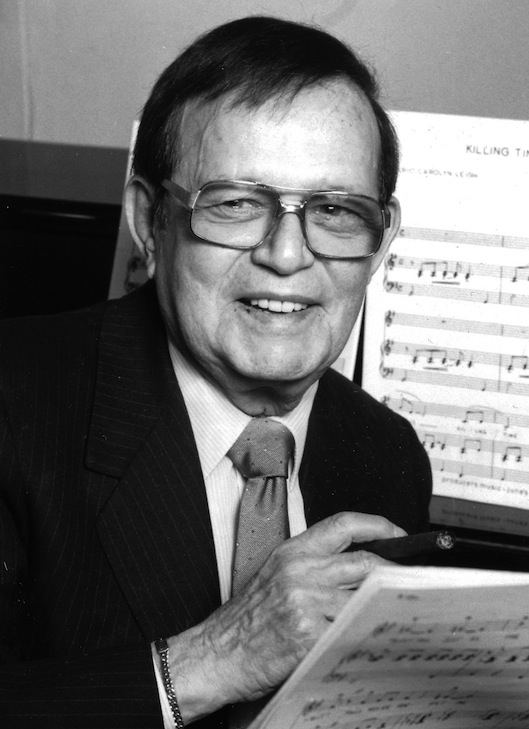Jule Styne was a remarkably versatile songwriter, equally successful on Broadway as he was in Hollywood.
Born in England, his family emigrated to Chicago when he was a child, and before his tenth birthday he had proven himself a piano prodigy, performing as a soloist with major symphony orchestras throughout the Midwest.
Later in Jazz Age Chicago, the classically trained Julius Stein re-invented himself as speakeasy habitué and jazz/blues/barrelhouse pianist Jule Styne. Aside from giving him invaluable musical experience, this freewheeling Jazz Age environment introduced him to both Al Capone and his unfortunate lifelong addiction to gambling.
At the height of the Depression, he made his way to Hollywood when film musicals were in full flower and joined the staff of Twentieth Century Fox to coach its biggest musical stars including Alice Faye and Shirley Temple.
Eventually his songwriting partnership with lyricist Sammy Cahn elevated him to the upper echelons of the music business. Beginning with “I´ve Heard That Song Before,” the songwriting team of Styne & Cahn would provide Frank Sinatra and the entire country with some of the most popular songs of the WWII Years: “I Fall In Love Too Easily,” “Five Minutes More,” “I´ll Walk Alone,” “Saturday Night Is The Loneliest Night of the Week,” “It´s Been A Long, Long Time,” “Let It Snow,” “Time After Time,” “I Don´t Want To Walk Without You, Baby” (written with another songwriting legend-to-be Frank Loesser).
This tremendous success in Hollywood would be superseded by his later success writing memorable vehicles for some of the Great White Way´s most luminous female stars: Carol Channing in GENTLEMEN PREFER BLONDES (“Diamonds Are A Girl´s Best Friend,” “Little Girl From Little Rock,” “Bye Bye Baby“); Judy Holliday in BELLS ARE RINGING (“Just In Time,” “The Party´s Over”); Ethel Merman in GYPSY (“Everything´s Coming Up Roses,” “Together,” “Small World”); and Barbra Streisand in FUNNY GIRL (“People,” “Don´t Rain on my Parade”).
Producing a perennially fresh catalogue of popular song standards followed by a sensational Broadway run, Jule Styne carved one of the most distinguished niches on record in American songwriting, surely one of the brightest lights of a Golden Age.
If you would like to engage Fred Miller for one of his Lectures-in-Song, please contact him directly at any time. For a full listing of all Lectures, click here.
Fred Miller’s Lectures-In-Song comprise a series of solo programs, each an historical, anecdotal and musical profile of some great personality or important aspect of American Popular Song. These Lectures are delivered by singer/pianist/narrator Miller at the piano, and each reflects his lifetime passion and appreciation for great music. He studied classical piano in his hometown of Albuquerque from ages 7-15 but early on gave up any notion of music as a profession. At that time, Fred assumed a musical career was either one devoted to the rigid discipline of classical music or being a freewheeling rock star, and he accurately decided he had no aptitude for either. However, at age 22, upon hearing Ella Fitzgerald sing Cole Porter, he found his calling and life’s mission.
Through the Seventies and Eighties, Miller studied and absorbed in minute detail the life and times and songs of nearly all the great American composers and lyricists who thrived during Broadway & Hollywood’s Golden Age between the two World Wars. In 1987, he founded Silver Dollar Productions in order to produce operettas, dramas, musicals and small cabarets. Silver Dollar Productions required ensemble casts, props, costumes and, most significantly, the challenges of publicity and selling tickets, and for a dozen busy years, the company presented an unbroken string of varied and highly lauded performances.
In 1999, Miller was simultaneously underwritten by both his local Hunterdon County Library and the Art Alliance of Philadelphia to present a series of six solo Lectures-In-Song, each devoted to one of the premiere Broadway/Hollywood songwriters: George Gershwin, Cole Porter, Irving Berlin, Richard Rodgers, Jerome Kern, and Harold Arlen.
In presenting history, biography and psychology while sitting at a piano singing the superlative songs of his heroes, Miller has found a single performing medium that utilizes most of his intellectual and musical passions.The list of Lectures-In-Song that began with six in 1999 is now more than seventy(and growing!), a joyful tribute to the boundlessly rich field of American Popular Song.

